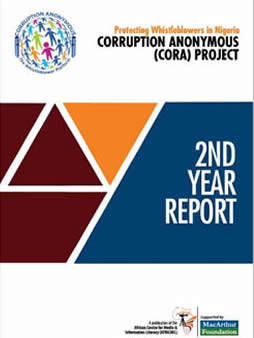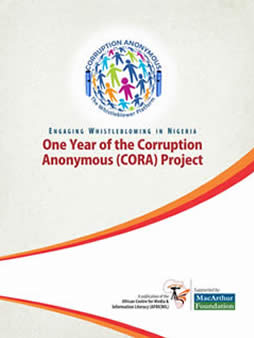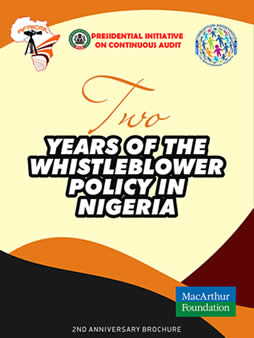June 21, 2024
Preamble
The 21st International Anti-Corruption Conference (IACC) 2024, themed “Confronting Global Threats: Standing Up for Integrity” hosted in Vilnius, Lithuania from 18-21 June, brought together civil society activists, journalists, academia, development organizations, world leaders, thought leaders, business leaders, and change agents from more than 140 countries to discuss crucial corruption-related issues and devise strategies for promoting integrity on a global scale.
Having participated in discussions on various thematic issues at the Conference, such as Strengthening the UNCAC’s Monitoring Mechanism to Increase Accountability & Promote Civic Space; Cutting off the Flow: Tackling Strategic Corruption in Political Finance; The Imperative of Inclusion: Marginalized Communities in The Fight against Corruption; Safeguarding Our Planet: Tackling Corruption in Climate Action, among others, we, the Nigerian delegates at the conference note the following disturbing trends in Nigeria.
Observations
1. That it is evident that corruption in Nigeria has garnered international attention, as Nigeria was frequently used as a case study during the sessions at IACC.
2. That despite the tireless efforts of civil society and anti-corruption agencies, Nigeria continues to grapple with rampant corruption in public sectors.
3. That there is a disconcerting worry among the public regarding judicial corruption, a concern that has been further exacerbated by the frequent issuance of contradictory orders from courts. This growing unease stems from the perception that some judges may be susceptible to external influences, compromising the integrity and impartiality of the judicial system.
4. That the lack of transparency and accountability in Nigeria’s security spending has resulted in minimal progress in ensuring the safety and security of its citizens. This is further exacerbated by the misuse of funds by civilian and military officials, perpetuating corruption.
5. That there is pervasive gender inequality and social exclusion in the country, which has deepened corruption.
6. That despite the government’s professed commitment to combat corruption, there is still unwarranted political interference in the operations of national and subnational anti-corruption agencies.
7. That the government’s economic policies, such as the removal of fuel subsidy and the depreciation of the Naira, have widened the gap between the rich and the poor, plunging millions of Nigerians into extreme poverty.
8. That one of the critical components of anti-corruption efforts, such as whistleblowers, lack adequate support and protection from the government.
9. That despite the existence of public procurement laws in Nigeria, contract awards and licensing processes remain veiled in secrecy, deviating from the prescribed standards of open contracting.
10. That although democracy should safeguard the civic space and those operating within it, journalists, anticorruption activists, and CSOs face incessant attacks from both state and non-state actors, hindering the participation of crucial stakeholders in Nigeria’s socio-political development.
11. That there is a complete disregard for the Asset Declaration law and institutions in Nigeria. Despite the government and CSOs’ efforts to recover assets, mismanagement of these assets persists, and the Proceeds of Crime Act (POCA) 2022 remains non-operational.
12. That the absence of CSO fighting coalitions in the nation has led to a situation where both the general public and political office holders disregard the principles of due process and the rule of law.
Resolutions:
In light of the aforementioned observations, we hereby make the following resolutions: 1. The Need for Collective Action:
• To activate and mobilize the existing democratic coalitions in the country to collectively combat corruption.
• To reaffirm our commitment to fighting corruption by providing necessary assistance to all stakeholders in addressing corruption within their respective domains.
• To collaborate with the private sector, professional bodies, organized labour, and the media to amplify discussions on corruption, ensuring that every voice is heard and valued, regardless of gender, region, or affiliation.
2. Dedication of Stakeholders:
• To support and collaborate with key stakeholders to foster an environment of integrity and accountability.
• To utilize the media and other social platforms to raise awareness about corruption issues and promote transparency in governance.
• To provide resources and expertise to support reforms and enhance regulatory frameworks, ensuring their effective implementation.
• To encourage compliance by urging both large and small, multinational and local organisations to conduct their affairs with integrity, without favouritism or undue influence.
3. The Impact of Corruption
• Collaborating with organised labour, professional organisations, and key stakeholders to tackle the economic challenges and widespread poverty experienced by Nigerians affected by the extensive corruption in the nation.
• Engaging with relevant stakeholders to address the disparities perpetuated by corruption, which deprive citizens of their fundamental rights and opportunities.
4. Collective Resolve
• Implementing Gender Equity and Social Inclusion (GESI) as a strategy to guarantee inclusivity for all.
• Standing united in shaping a future where transparency and accountability are standard practices, not rare occurrences, in Nigeria.
Recommendations/Call to Action:
1. We urge the President, Governors, Legislators, and other elected and appointed state officials to set a positive example and guarantee the transparent and accountable implementation of all regulatory frameworks, including the National Anti-Corruption Strategy.
2. We call on public officials to maintain the utmost integrity, fostering a culture of accountability, gender equality, and social inclusion at every level of government.
3. We urge government entities at all levels to create and adopt a comprehensive implementation framework for the national anti-corruption strategy.
4.We insist on transparency in the utilization of security vote funds, allowing civil society and the public to scrutinize the spending mechanism. This will ensure that the safety and security of citizens are adequately addressed.
5. We call on law enforcement agencies, the judiciary, and the Federal and State Ministries of Justice to fulfil their responsibilities by strictly enforcing anti-corruption laws and promptly apprehending and prosecuting those involved in illicit financial crimes.
6. We demand the safeguarding of the civic space and the protection and security of civic actors, including citizen monitors, whistleblowers, and journalists, in their work and advocacy against corruption.
7. We call all Nigerians to join us in this crucial moment as we strive for a brighter, more equitable, and prosperous Nigeria.
Long live the Federal Republic of Nigeria!
Signed:
Civil Society Legislative Advocacy Centre (CISLAC)
African Centre for Media & Information Literacy (AFRICMIL)
Resource Centre for Human Rights & Civic Education (CHRICED)
HEDA Resource Centre
Connected Development (CODE)
Public and Private Development Centre (PPDC)
Centre for Democracy and Development (CDD)
Center for Fiscal Transparency and Integrity Watch
Palace of Priests Assembly (PPA)


















